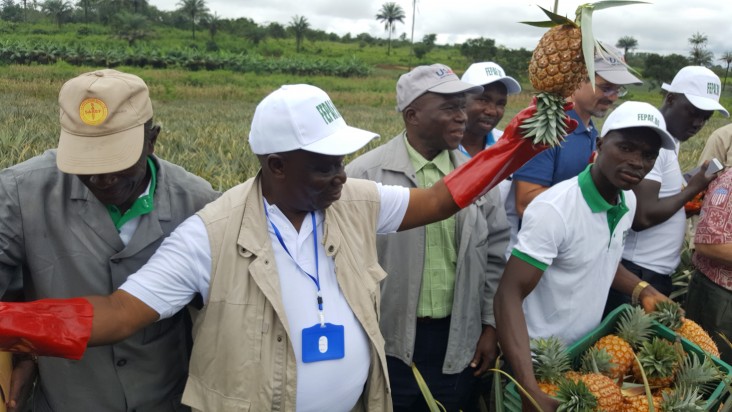Speeches Shim

September 2018 — The Federation of Fruit Planters of Lower Guinea is composed of 1,052 fruit producers, including 209 women. While pineapple is their main crop, they also produce banana, mango and citrus fruit as well as oil palm and cashew.
The federation — whose members are located in the prefectures of Kindia, Forécariah, Coyah, Dubréka, Boffa and Boke — has many resources to aid production: a suitable climate and soils, fertile land, and agronomic research centers located in the region to support further development of the fruit sector.
But despite these resources, the federation is faced with challenges such as farming methods and practices that result in low productivity, lack of means to transport farm products, and limited marketing capacity. Other challenges include poor access to agricultural inputs and difficulty ensuring water supply in the dry season.
In 2017, the USAID-funded Feed the Future Guinea Agricultural Services project, which runs from 2016 to 2021, began supporting the federation to improve its working conditions and methods to generate more revenue for its members.
As part of the project, the AVENIR (Apprenticeship in Extension, Entrepreneurship and Rural Innovation) apprenticeship program is designed to train and provide practical business experience for 640 young unemployed Guinean university graduates to equip them with the skills to develop agricultural enterprises. (See related story.)
After training young graduates, who are now known as AVENIR agents, in entrepreneurship and various agricultural techniques, the project deployed them to the pineapple plantations of federation members. The agents help the members apply better farming practices and new technologies such as plastic mulches, raised nurseries, and multiplication of pineapple strains.
They also introduce mobi-pumps and solar dryers to the members. The solar dryer dries surplus fruits like pineapples, mangoes and coconuts to avoid harvest waste. It takes about a day in the dryer on a sunny day for the fruit to dry. The solar dryer also dries vegetables, which dry in only half a day. The mobi-pump, which can help members access water during the dry season, is attached to and powered by an ordinary motorcycle, and pumps water from its source to irrigate areas smaller than 1 hectare.
The AVENIR agents are using these technologies to teach farmers and entrepreneurs the importance of and opportunities in food transformation.
Project results are impressive: Pineapple production has increased significantly at the plantations of federation members.
“With the support of young AVENIR agents, our pineapple producers are better organized now and their yields are higher,” says Pépé Koivogui, the federation’s technical adviser in charge of production. “We hope to harvest between 35 to 45 tons of pineapples per hectare this year against 30 or 32 tons in previous years. We expect to produce a total of 1,500 tons of pineapple this year against 1,000 tons last year.”
The project is also helping the federation gain access to agricultural inputs and to strengthen its management skills and links to business.
Following training in business management, the federation adopted a business plan and acquired a refrigerated truck to transport fruit to the different consumer markets in the West African subregion. Thanks to the truck, fruits arrive at destinations in good condition and larger quantities despite the distance, allowing the federation to negotiate better prices.
The federation also recently established a website that significantly raises the organization’s visibility beyond the borders of Guinea.
The Feed the Future Guinea Agricultural Services project is designed to improve rural and agriculture-based livelihoods as well as improve nutrition. Private-sector partners are invited to leverage technical expertise, innovations, networks and financial resources to advance Guinea’s agricultural sector.
LINKS
Follow @USAIDGuinea, on Facebook, on Flickr

Comment
Make a general inquiry or suggest an improvement.